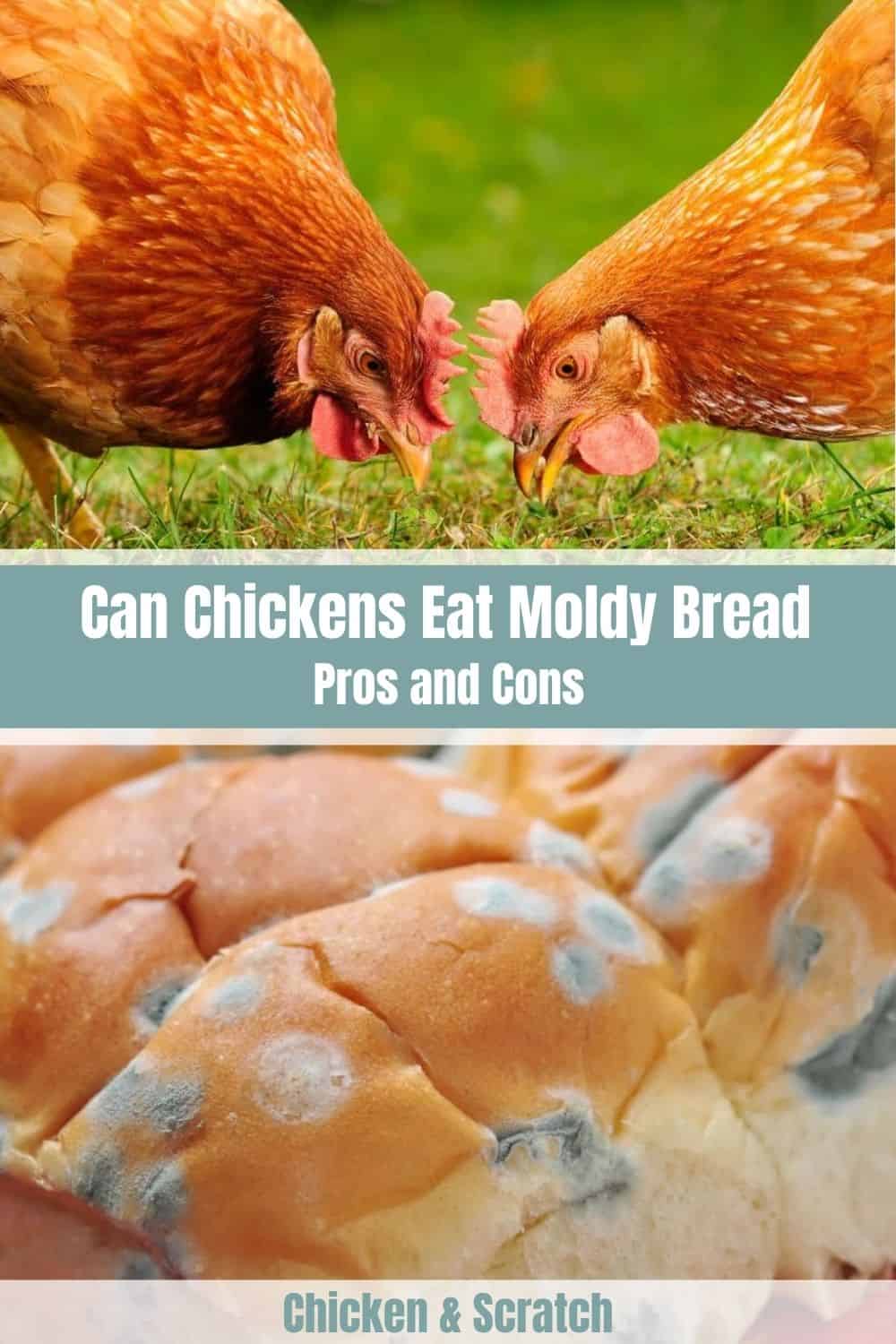Bread is one of the most consumed foods in the world. Because of the amount of bread baked daily, there might be times when not all of it is eaten. To avoid wastage, you might want to feed bread to your chickens. However, what happens when it goes stale? Can chickens eat moldy bread?
Why Does Mold Grow on Bread?
Mold spores are microscopic fungi that float around. You can’t see or touch them, but they are everywhere. When it settles on something like damp bread, it can feed on it and produce chemicals. The chemicals then start breaking the bread down, causing it to rot.
he more the bread rots, the more mold grows. In a nutshell, this is how mold grows on bread. There might be more complex processes and explanations involved, especially if you want to get into its microbiology. As long as there are nutrients left on the bread, the molds will keep on growing. It doesn’t even matter if you keep the bread in your refrigerator.
Can Chickens Eat Bread With Molds?
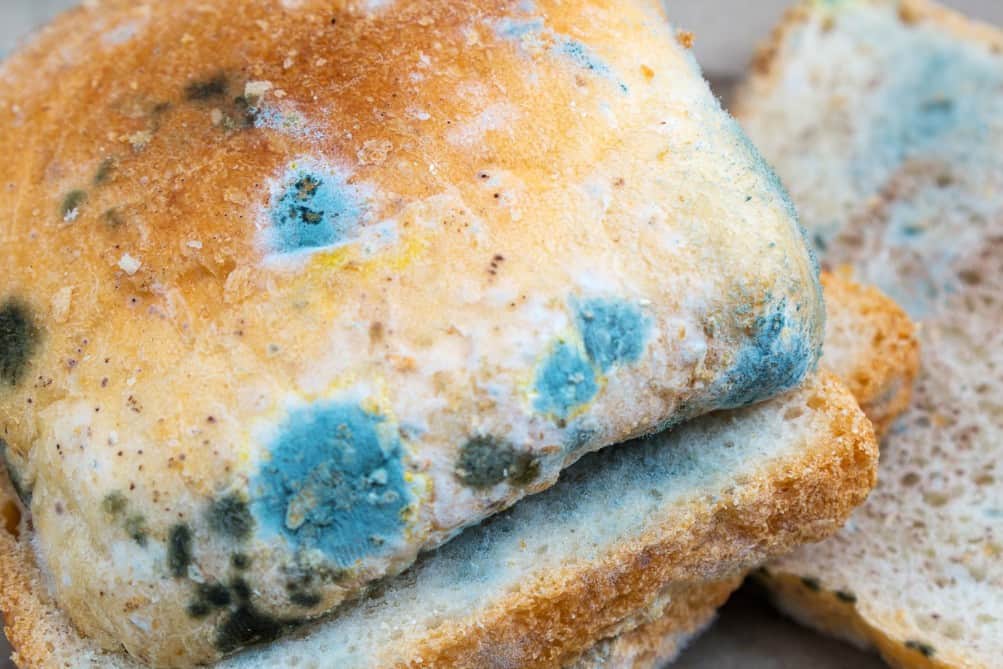
You don’t have to be a biology expert to know that giving moldy bread to chickens is a big “no”! Yes, chickens can definitely eat bread. But you should avoid feeding your chickens this kind of bread. With that said, you need to know the difference between stale and moldy bread. The latter is not safe for chicken consumption at all! When you feed moldy bread to your chickens, it could affect their health and well-being.
Identify Bad Bread
If bread is a staple in your diet, you should know how to figure out what it looks like when it has gone bad. Things you should remember before sharing pieces of bread with your chickens:
If you see any blue, black, green, and white spots on the bread, it means mold has infested it. It’s a telltale sign that the bread has gone very bad. If this happens, throw the bread away as soon as possible. Try keeping it away from members of your family as well. If it’s not safe for people, it isn’t safe for your chickens as well.
If the bread starts smelling weird, it’s another sign that you should discard it. If the smell resembles alcohol or vinegar, then it means you shouldn’t be keeping or eating it.
Types Of Molds That Grow On Bread
There are numerous molds in existence. And for you to find out what type of mold has grown on the bread, you need to observe these three important points:
- Texture
- Color
- Size/Shape
Once you know what to check, it’s easier to identify which type of mold has infested the bread. Take note that molds do not only cover the surface or visible part of the bread. They have roots that have grown deep inside the bread.
While there are various molds out there, here are some of the most common molds that grow on bread that you know about:
Penicillium sp.
It is one of the most common mold types that you can find growing on bread. It forms white, blue, or grey colored patches on the bread. The patches that appear on the bread look fuzzy. The Penicillium sp. usually grows in cold temperatures. That means that even if you leave the bread inside the fridge for storage, this type of mold can still grow on it.
Rhizopus stolonifer
Perhaps this is the most common mold that grows on bread. It is often referred to as the ”black bread mold” because it leaves black mold spots. This type of mold does not actually start as black. It can appear white, green, or blue. However, as it continues to grow, it leaves black circular patches all over the bread.
Aspergillus sp
If you see a light green or yellow mold on the bread, Aspergillus sp. might have grown on it. However, it can sometimes appear in a different color. It usually leaves fuzzy patches on the bread.
Cladosporium sp
Cladosporium sp. is another mold that grows on bread. It has a smooth texture and leaves dark, round, and large mold spots on the bread. The color typically ranges from dark green to black. Apart from the color, this type of mold often has a strong odor.
What Happens When Chickens Eat Moldy Bread?
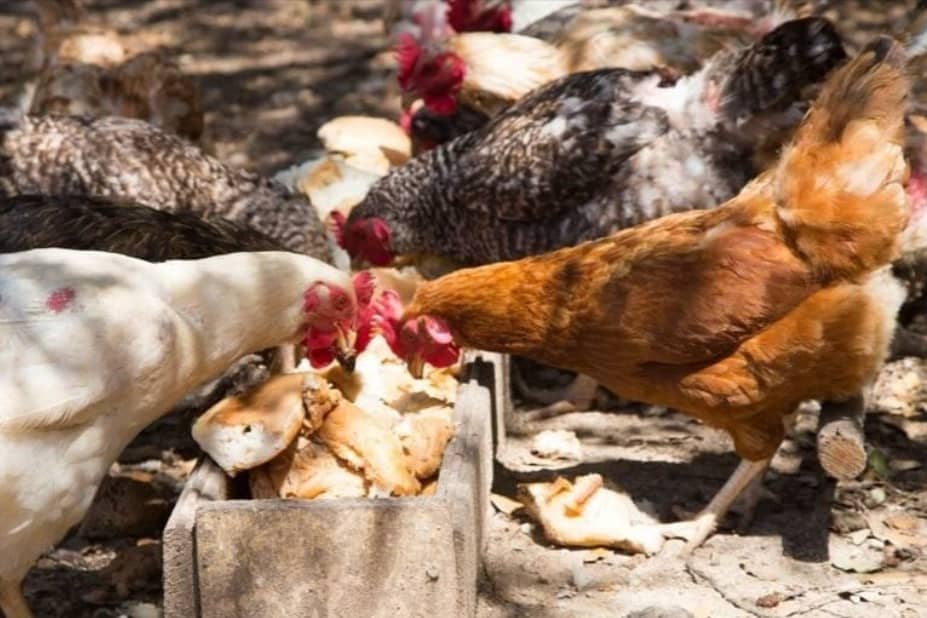
The toxins that molds produce can cause diseases. These diseases are referred to as Mycotoxicosis. In chickens, different Mycotoxicosis develop from various toxins. These can affect the various parts of the chickens’ body. If Mycotoxicosis has infiltrated the chickens, they might go through the following:
- Diarrhea
- Decrease in weight gain
- Reduction of egg production
- Paralysis
- Paleness of combs and shanks
There might be other symptoms that chickens can manifest if they have Mycotoxicosis in their systems. If the infection is in its early stage, there’s a chance that it might be cured or treated.
If it becomes something fatal, it can be dangerous to the health and welfare of the birds. They can develop these life-changing and life-threatening conditions:
- Liver and Kidney damages
- Anemia
- Birth Defects
- Neurological issues
- Reduction in nutrient absorption
- Weight loss
- Decrease in egg production
These are just some examples of the effects of Mycotoxicosis in chickens. Depending on what type of toxins and their quantity, there might be other health issues that they can develop.
Give Them Bread As A Treat
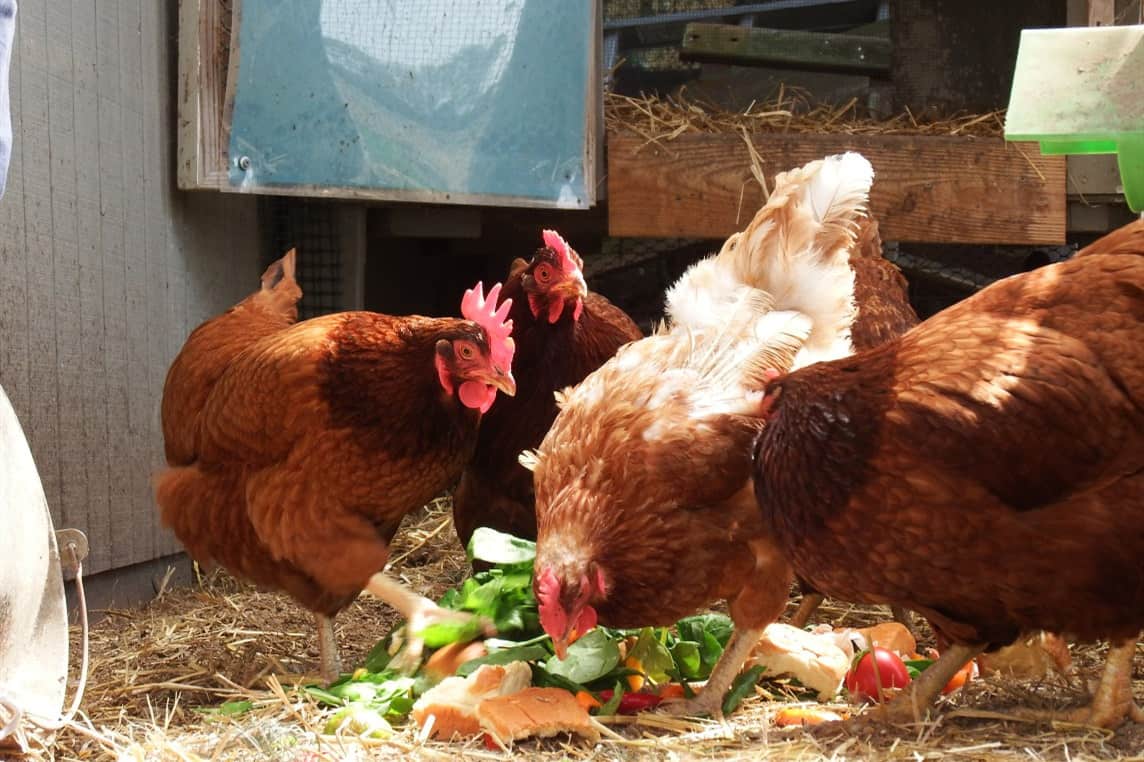
Despite the health concerns that go with moldy bread, it doesn’t mean that you shouldn’t give your beloved chicken bread at all. Perhaps from time to time, you can give them bread as a treat. Just make sure these pieces of bread are fresh or have not gone stale.
If the bread you are giving your chickens is from your leftovers, consider them as treats and not their staple food. You have to be responsible for their overall health, and that includes giving them a well-balanced diet.
You can’t just throw table scraps at your chickens and call it a day! They have to be fed correctly. They must get the right amount of vitamins, minerals, and whatnot. Doing so ensures that they grow healthy and strong.
Making Bread Fun
If you are treating your chickens to bread, there are a couple of things you can do to spice things up. You can make bread eating exciting by trying the following:
Bread and Feed Mash
You can mix bread and your chickens’ favorite feed. It’s something easy that you can do, especially if you want to try something new. All you need to do is to put the feed and bread together and add some water. If you want to make it even more nutritious, you can add vegetables to the mix. You can try adding either squash, pumpkin, broccoli, and many other healthy treats out there.
Once you have tried mixing and matching bread with various vegetables, you can try observing which ones your chickens like the most. You can make their favorite mash combo for them to enjoy!
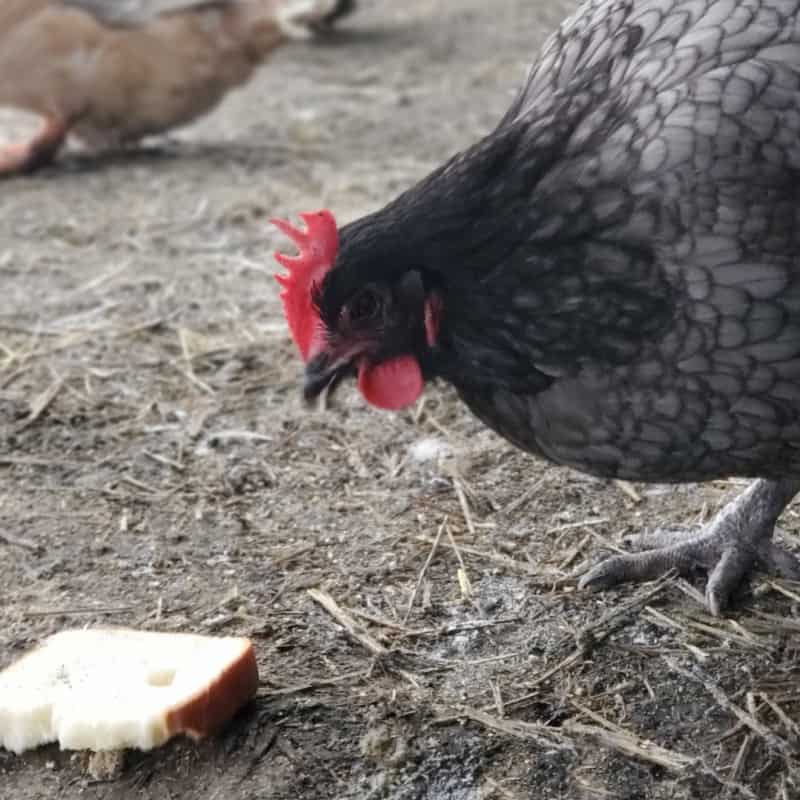
Special Chicken Bread
If you know how to bake bread for your family, then it shouldn’t be hard for you to make one for your chickens. You might have some recipes in mind but do consider checking if all the ingredients are safe for chickens to consume. Once you have that down, then you can start putting your apron on and baking your special chicken bread.
To make your special bread even more exciting, you can try adding other ingredients that are highly nutritious and beneficial to chickens. There are vegetables and fruits that can make the bread even better.
The good thing about baking your bread for the chickens is that you know what goes into it. You know what you are feeding them. It decreases the chance of them ingesting or eating something that they shouldn’t.
If you have baked special bread for the chickens, you need to store it properly. If you want to make bread last longer, you can try freezing it. You can use a freezer bag and wrap the bread as tightly as possible. If you need it, defrost it ahead of time.
Bread is Not For Baby Chicks
While it’s okay to give your adult chickens bread, it’s not something that you should give to baby chicks. Bread doesn’t really have high nutritional value. It’s not something you should give to growing chicks because it doesn’t provide the nutrients they need.
If you want your baby chicks to grow well, they need a lot of protein in their diets. This is not something that they can get from bread. There are other food sources of nutrients out there for the baby chickens. Perhaps once these chicks have grown, they can get bread as a treat from you!
Keep Your Chickens Safe And Avoid Moldy Bread
Giving your chickens bread from time to time is something that they would surely appreciate. However, you need to be 100% sure that you aren’t giving them something rotten. You don’t want your chickens to eat moldy bread that could potentially make them sick.
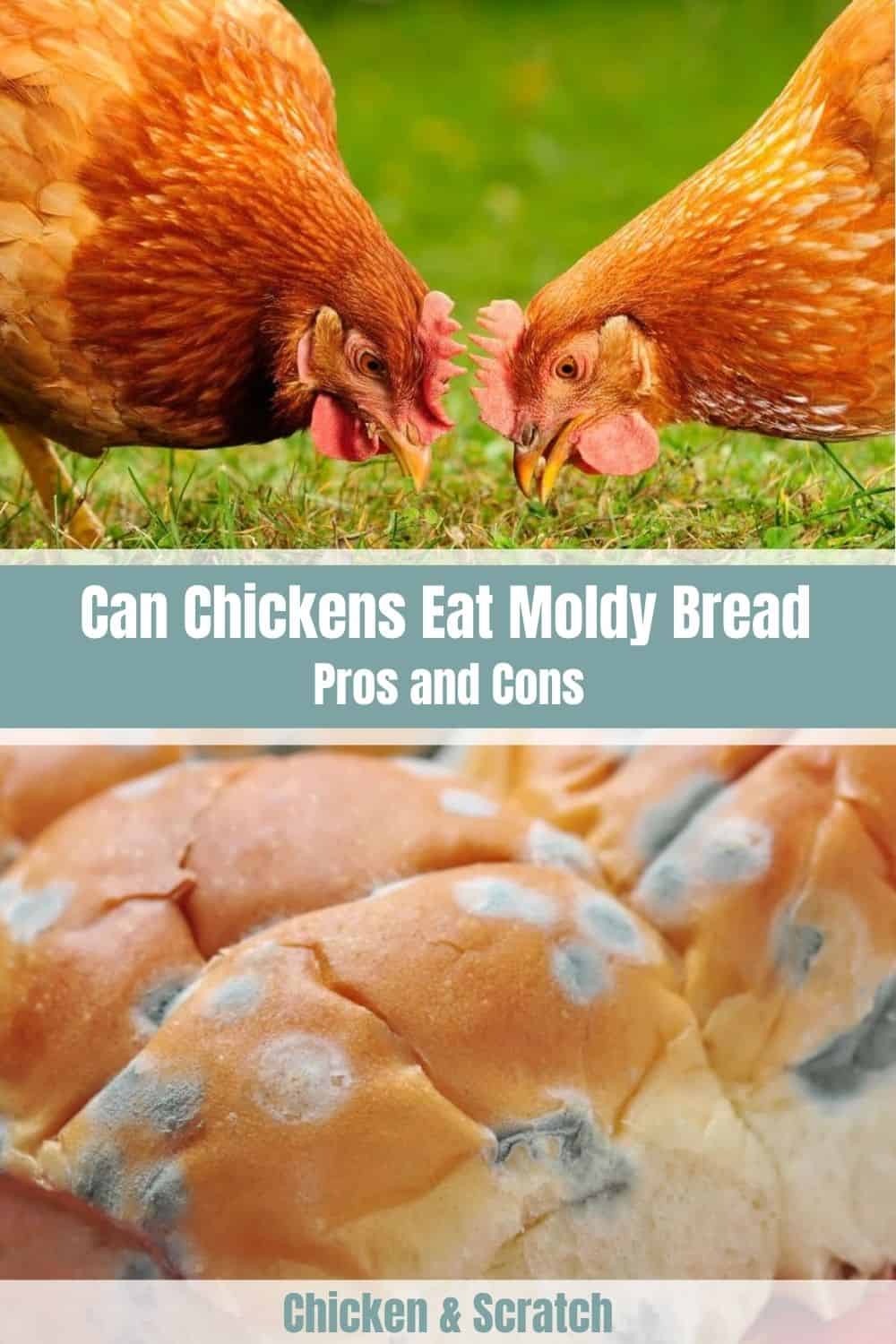

Joseph Hudson has been raising chickens for over 15 years. In 2018, he completed the Agriculture & Natural Resources program at Mt. San Antonio College. He currently raises over 1400 chickens on his 7.5-hectare farm. He keeps sharing his experience on raising healthy and happy chickens on Chicken Scratch The Foundry.
